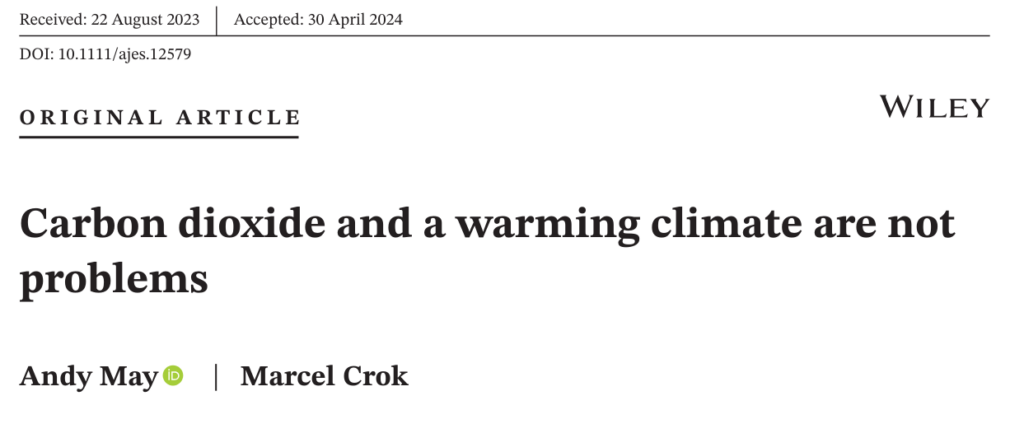
© Clintel Foundation / Thursday May 30, 2024
Clintel publication in the American Journal of Economics and Sociology
Press release by the Climate Intelligence Foundation (Clintel)
“Carbon Dioxide and a Warming Climate are not problems”, that is the somewhat provocative title of a newly published paper by Andy May and Marcel Crok in the American Journal of Economics and Sociology. The paper relies heavily on the Clintel book The Frozen Climate Views of the IPCC, that Crok and May published last year. In that book an international group of scientists document serious errors and biases in the latest IPCC report (AR6).

The IPCC AR6 Working Group II (WGII) report claims that human-caused climate change or global warming is dangerous. According to the report:
“Human-induced climate change … has caused widespread adverse impacts and related losses and damages to nature and people, beyond natural climate variability. … The rise in weather and climate extremes has led to some irreversible impacts as natural and human systems are pushed beyond their ability to adapt (high confidence).”
In their paper May and Crok show how misleading this statement by the IPCC is. When you carefully read the AR6 WG1 report (the first volume of AR6), the IPCC itself admits that the most damaging extreme weather events, especially flooding and tropical cyclones, have not increased. In fact, an effect of CO2 (called “attribution” in IPCC jargon) has not been found. This is rather good news that the IPCC fails to communicate in clear terms. So, the best one could say is that the WGI and WGII reports contradict one another on this important point.
Even better news is that globally, weather-related disaster losses as a fraction of GDP have declined slightly and climate related deaths have declined by a whopping 99% in the past century despite a fourfold increase in population.
The paper concludes:
“The infrastructure to replace fossil fuels does not exist and likely cannot be built in a short time. Current realistic estimates of future energy use suggest that fossil fuels will still supply half our energy in 2050 and beyond. Yet, no credible evidence exists that this is a problem or will become a problem. Recent research into climate change has suggested that nature plays some role, and certainly greenhouse gas emissions may play some role as well. What we do not know is how much of climate change is human-caused and how much is natural. No drastic changes to our economy are justified until we can figure this out.”
See the journal and abstract here, the article is paywalled, but the author’s final submission can be read here.
If you have questions about the paper or if you want an interview with one of the authors, please contact communication@clintel.org.
ABOUT CLINTEL
The Climate Intelligence foundation (Clintel) was founded in 2019 by emeritus professor of geophysics Guus Berkhout and science journalist Marcel Crok. Clintel’s main objective is to generate knowledge and understanding of the causes and effects of climate change, as well as the effects of climate policy. Clintel published the World Climate Declaration, which has now been signed by more than 1900 scientists and experts. Its central message is “there is no climate emergency”.
